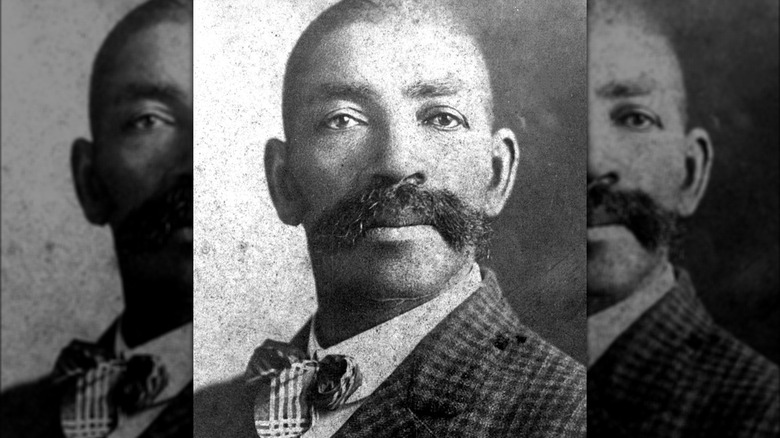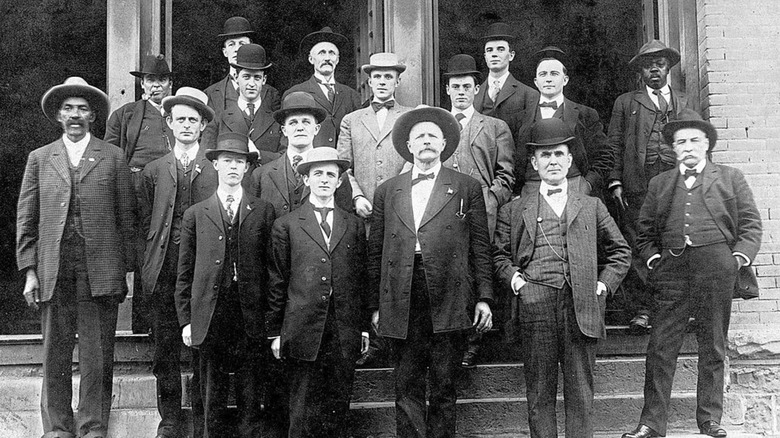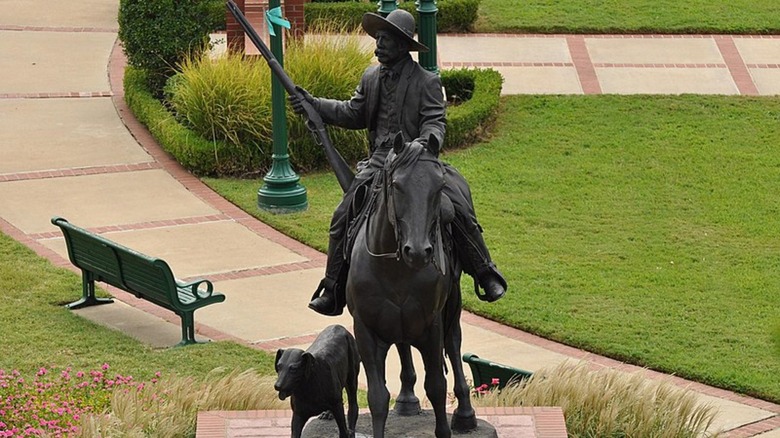The True Story Of The Lone Ranger's Inspiration, Bass Reeves
The Lone Ranger, a masked lawman who patrolled the frontier with his Native American partner, Tonto, made his first appearance in a radio drama back in 1933. Since then, the character has gone on to star in a comic book series, a TV show, and a Gore Verbinski film that was decimated by Rotten Tomatoes. In other words, he's one of the most enduring artistic representations of the historic period known to us now as the Wild West ... and also one of its most whitewashed.
See, the fictional character of the Lone Ranger is white, but the man who likely inspired him was not. In the late 19th and early 20th century, a Black lawman named Bass Reeves was well known for his prowess at his job and the enthralling stories of his exploits, which often sound strikingly familiar to those of the Lone Ranger. Considering the ways that Hollywood has helped erase Black and Latino cowboys from our collective cultural memory, it should come as no surprise that the same thing happened to a Black deputy U.S. Marshal.
A slave turned lawman
Bass Reeves was born into slavery in Arkansas in 1838 and was reportedly well-regarded by the family that enslaved him. According to Legends of America, there are different stories about how Reeves broke free. Both versions say it happened during the Civil War when he was accompanying a member of the family that enslaved him to battle. One version says there was an incident in which he punched his enslaver out cold after a game of cards and ran away knowing that the offense was punishable by death. The other version says Reeves simply abandoned his enslaver in the chaos of the Civil War to seek his freedom because he could. After his self-emancipation, Reeves is said to have lived among the Seminole, Cherokee, and Creek Native Americans in what was then called Indian Territory (present-day Oklahoma). Because of his childhood spent in slavery, Reeves was illiterate, but he apparently learned indigenous languages and cultural customs from the Native Americans with whom he became acquainted, and that made him invaluable to law enforcement trying to curb outlawry in the area.
He was hired as a deputy in 1875 and became one of the most revered lawmen of the American frontier, as well as the first black deputy U.S. Marshal west of the Mississippi. In addition to his proficiency with indigenous languages, Reeves was known for his fearlessness and resourcefulness. One of his favorite tactics was using a variety of disguises to trick outlaws into their arrest.
A ruthless protector of the law
Bass Reeves' guile and resourcefulness made him a force to be reckoned with, but he was also ruthless in the way he dealt with criminals. So much so that he came to be known as the "most feared U.S. Marshal in the Indian county," according to W. David Baird and Danney Goble's book "The Story of Oklahoma," which lists Reeves as one of "eight notable Oklahomans."
Per the same source, over the course of his career, Reeves is believed to have killed 14 men, despite the fact that U.S. Marshals such as Reeves were only paid if they could bring the fugitives they were pursuing to court alive. In such cases, Reeves claimed he was acting in self-defense.
It is believed that Reeves made around 3,000 arrests before his retirement in 1917, one of whom is believed to have been his own son. According to "Black Gun, Silver Star: The Life and Legend of Frontier Marshal Bass Reeves" by Art Burton, Reeves' son, Bennie, admitted in court to having shot his wife to death out of jealousy. When he was asked who had arrested him in relation to the crime, he told the court he had been taken in by his father.
Bass Reeves' brush with the law
But Bass Reeves famously had an itchy trigger finger of his own, and in one notorious incident, it was the Marshal himself who was facing prison time for murder. As described in "Black Gun, Silver Star: The Life and Legend of Frontier Marshal Bass Reeves," which includes contemporary news reports on Reeves' near-downfall, the lawman was accused of shooting to death William Leach, a man who worked as a cook at the Marshal's camp, in 1884.
In January 1886, Reeves was arrested and put on trial for murder, with the newspapers announcing that the famous Marshal had killed his cook over a "trivial offense." For his part, Reeves claimed that he had discharged his firearm by accident while cleaning it. Reports of the killing and arrest tended to paint a less than flattering picture of Reeves, who was characterized in the papers as an unscrupulous and corrupt lawman who would extort money from those in his charge and make unwelcome advances to women he encountered. Reeves spent six months in jail as his trial played out, and in the end was able to convince the court of his innocence, and he returned to his career, his reputation further hardened.
Bass Reeves: template for a hero
Reeves' love of disguise, his skills with firearms, and his detective instincts are just some of the similarities between him and the fictional Lone Ranger Art Burton points out in "Black Gun, Silver Star: The Life and Legend of Frontier Marshal Bass Reeves." On top of that, both men were known for their grey horses. Plus, there was Reeves' friend and frequent collaborator, Grant Johnson, who was a Native American, recalling the Lone Ranger's partner, Tonto.
Although there's no direct evidence confirming The Lone Ranger creators George Trendle and Fran Striker were influenced by Reeves, Burton argues that Reeves was a popular figure of American culture at the time the show was created, and it's unlikely that anyone interested in the Wild West wouldn't have known about him and been familiar with his legend. Combine that with the similarities between the two men, and it's easy to see how Bass Reeves may have been the real-life Lone Ranger.
In recent years Reeves has begun to emerge from the shadow of the famous fictional hero he inspired. As well as books chronicling his exploits, a statue of the famous lawman now stands in Ross Pendergraft Park, Fort Smith, Arkansas. He has also appeared as a character in several movies and TV shows, the most prominent of which, "Lawmen: Bass Reeves," premiers on Paramount+ on November 5, 2023.




